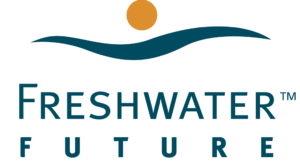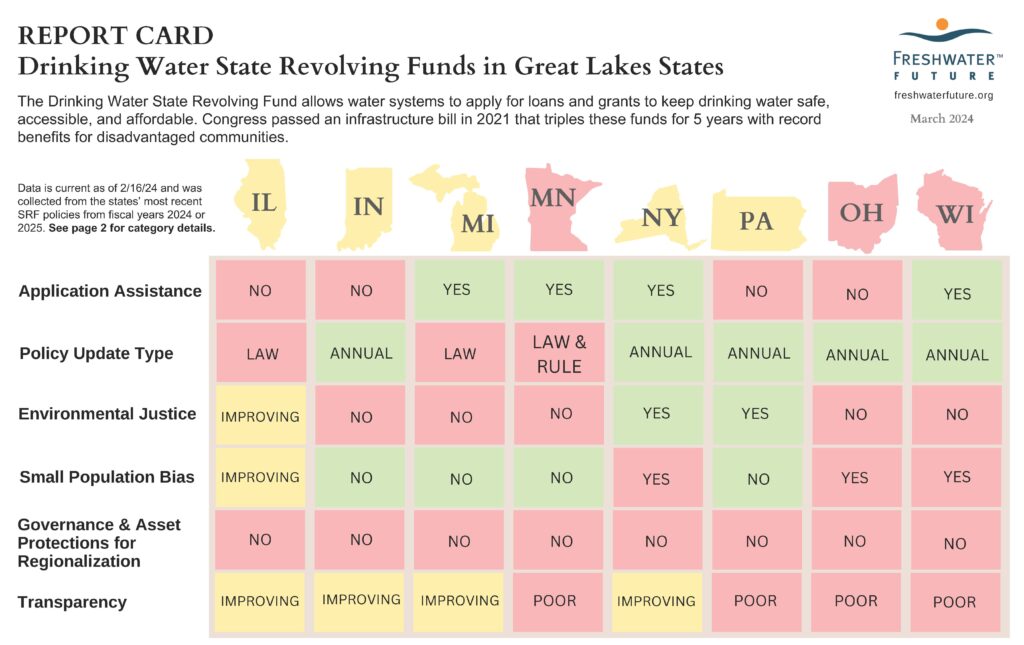Monitoring Critical Drinking Water Funds Across The Great Lakes
To keep our drinking water and wastewater safe and clean, many of our communities depend on cheap financing from our state governments through a “state revolving fund” (SRF). This funding helps our local water departments replace old infrastructure, like toxic lead pipes, water treatment plants, and sewer systems. Families that cannot afford increasing water rates to pay for these infrastructure projects benefit from the SRF to keep their water safe, clean, and affordable.
Last year, Freshwater Future created our first annual Report Card that grades each Great Lakes state’s SRF program on the difficulty of updating SRF policies, accessibility to funding, Environmental Justice considerations, and impacts on local decision-making and affordability (regionalization/consolidation incentives). Our new 2024 Report Card added an additional category, transparency, to grade how easy it is to access critical program and funding information, such as project scoring criteria, details of funded projects, and definitions of “disadvantaged communities.” It also includes updates based on changes made in each state’s SRF program since last June. Several improvements reflect community members’ voices that pushed for fairer and more just systems that distribute funding based on definitions of “disadvantaged communities” and project scoring criteria.
Improvements this year include:
-
New York state now offers application assistance. Without this help, many communities do not have the resources to apply for the funds.
-
Pennsylvania is updating its policies on an annual basis, as recommended by the U.S. EPA
-
Pennsylvania also added Environmental Justice as a part of its “disadvantaged communities” definition.
-
Illinois is removing the population size limit for “disadvantaged communities” to qualify for lead service line replacement grants, low-interest loans, and forgivable loans.
-
Half of the Great Lakes states made changes that improve the transparency of the program policies and decisions in response to public comments. Examples include:
-
Pennsylvania will begin publishing annual reports, which will include environmental and health funding outcomes, additional project details, and compliance with disadvantaged community funding requirements
-
Illinois is now publishing PDF versions of their documents, allowing for more stakeholders to access this information as it allows for language translation and use with assistive technology
-
In Summer and Fall of 2024, advocates will have another opportunity to voice support for critical improvements that ensure this funding goes to the communities that need it the most. These communities often cannot afford increased water rates, nor can their local governments access traditional sources of funding like municipal bonds. Freshwater Future continues to push for improved SRF policies that prioritize issues like Environmental Justice, affordability of water bills, and protecting local control of water systems from regionalization, consolidation, and privatization.
Every community member can participate and support SRF advocacy, both locally and to the state government. Here are some ways to use your voice and support positive change:
- Subscribe to Freshwater Future’s mailing list to be informed when your state’s SRF program policies are open for public comment. We will share with you the most important changes needed for a fair program that supports the communities most in need of clean and safe water, and we make it easy to submit comments.
- Encourage your local government and water utility to apply for SRF funding for local projects. Not all communities know about these opportunities and have never applied.
- Tell your state-level representatives and senators that reforms are needed to improve these outdated programs. Improvements and oversight of these programs are badly needed across all states, and some changes cannot be made without new laws and regulations, like in Illinois, Michigan, and Minnesota.








